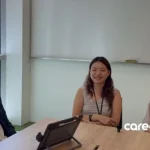According to a 10-year study analysing over 17,000 C-suite executives, those who reach a C-suite position in a shorter time compared to the average 24 years have three traits in common.
- They take more calculated risks. This includes building a new business unit from the ground up within their organisation or making lateral moves to smaller companies to take on increased sets of responsibilities. In all cases, sprinters leveraged these opportunities to leave their mark and hone their entrepreneurial capabilities.
- Often, they were offered roles that they believed they did not have the capabilities for, such as taking a new position in an unrelated function. Many took the leap of faith and accepted the challenge and the increased in exposure allows them to make sound business judgements – with a wider latitude of perspective and skills.
- These leaders were always quick to take initiative, especially in identifying new opportunities, championing new initiatives, and fixing areas that needed improvement. They viewed every situation as a chance to develop their problem-solving and stakeholder management skills.
What are some of the key skills that those who are looking to move higher up into leadership roles need to acquire?
Soft skills often hold greater value than technical skills alone. A true leader not only focused on achieving revenue for the business, but are also invested in developing their people by fostering an environment that is both innovative and positive. To advance into a leadership position, it is important for individuals to cultivate these three key soft skills:
- Effective Communication: Strong leaders communicate their vision with clarity, actively listening, and provide constructive feedback. This openness fosters transparency and builds trust, ensuring team members feel heard and aligned with shared goals.
- Emotional Intelligence (EQ): Leaders with high EQ usually exhibit empathy toward their team members, adapt well to different situations, and handle conflicts gracefully. This creates a motivating and supportive work environment that drives team morale and performances.
- Strategic Thinking: Strategic leaders set clear goals, anticipate challenges, and encourage innovation within their teams. By thoughtfully planning and inspiring those around them, they ensure everyone is working toward the same objectives, helping the organisation achieve its business goals.
Are there any skills that Singaporeans are better and worse at when it comes to these skills, and what advice would there be for them to improve themselves at to be C-suite- ready?
Singaporeans are often recognised for their strong work ethic and commitment to their roles, qualities that have earned them a reputation for reliability and productivity. However, their focus on tasks and efficiency can sometimes overshadow the importance of interpersonal relationships, potentially affecting team dynamics, communications, and workplace relationships.
To become effective C-suite leaders, it’s crucial to be receptive to feedback and adaptable to change. By fostering an open and collaborative work environment, leaders can build strong relationships with their team members. Active listening, empathy, and clear communication are essential to ensure that everyone feels valued and heard. Furthermore, leaders can also invest themselves in team-building activities which can strengthen team cohesion, creating a positive work culture. By prioritising these qualities, they can inspire and motivate their teams to achieve greater success for the business.
What are some local C-suite business executive leaders who are good examples for those aspiring to follow in their footsteps, and what traits do they display that are worth learning from?
Singapore is recognised globally as a dynamic business hub, driven by leaders who inspire excellence and set new standards.
People-centric leadership, for instance, has been shown to create environments where employees feel empowered to share their ideas and contribute openly. By prioritising trust, collaboration, and a “growth mindset” that emphasises open communication and empathy, leaders foster a culture of continuous learning and innovation. This approach not only allows employees to reach their full potential but also drives business success and competitiveness, even within highly competitive industries.
In summary, leaders who prioritise people and cultivate open, innovative workplaces demonstrate a powerful approach to success. This mindset not only shapes their own achievements but also serves as an inspiring model for future leaders in Singapore. A notable example is highlighted by Forbes, which discusses Marriott International’s people-centric approach.
This article was done in collaboration with Adecco.















